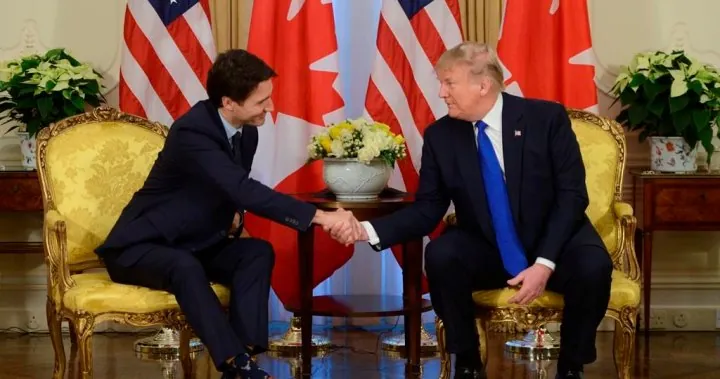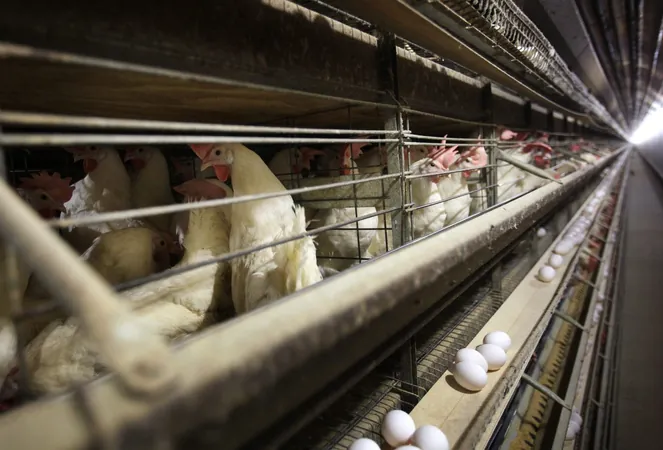
Ontario Premier Doug Ford Urges Canada and U.S. to Forge New Trade Deal Amidst Concerns Over Mexico's Trade Policies
2024-11-12
Author: Michael
Introduction
Ontario Premier Doug Ford made headlines on Tuesday with a bold assertion that Mexico "shouldn't have a seat at the table" in upcoming North American trade talks if it fails to align its tariffs on Chinese imports with those of Canada and the United States. His comments come as North America anticipates the return of former President Donald Trump to the White House and a 2026 review of the Canada-United States-Mexico Agreement (CUSMA), which succeeded NAFTA during Trump’s first term.
Trade Concerns Raised by Ford
Ford's remarks echo concerns voiced by both him and Trump regarding Mexico’s perceived role in enabling Chinese companies to circumvent CUSMA regulations by exporting vehicles and parts into the U.S. and Canada through Mexican manufacturing plants. "If Mexico won't fight transshipment by, at the very least, matching Canadian and American tariffs on Chinese imports, they shouldn't have access to the world’s largest economy," stated Ford, emphasizing the need for a robust economic partnership in North America.
Tariffs Imposed by Canada and the U.S.
In a recent development, Canada and the U.S. imposed 100% tariffs on Chinese electric vehicle imports and added a 25% levy on steel and aluminum from China earlier this year, while Mexico remained silent on similar actions. Premier Ford fears that Chinese automakers, particularly BYD—one of the largest in the world—could exploit this gap by establishing manufacturing facilities in Mexico, allowing them to leverage CUSMA's duty-free import rules to infiltrate the North American market.
Trade Imbalance Issues
Ford also highlighted a troubling trade imbalance between Ontario and Mexico, where the latter exports the majority of goods worth $40 billion in annual trade. He asserted, "If Mexico wants a bilateral trade deal with Canada, God bless them. But I’m not going to be drawn down by these cheap imports that threaten the jobs of hard-working Ontarians."
Government Responses
In a press conference following Ford's statements, Prime Minister Justin Trudeau acknowledged the varying concerns over Chinese trade practices and reaffirmed Canada's commitment to work collaboratively with the U.S. and Mexico to protect jobs and maintain fair trade.
Importance of a Unified Stance
Canadian officials have recognized the importance of aligning with U.S. trade strategies, particularly regarding Chinese products. Deputy Prime Minister and Finance Minister Chrystia Freeland reiterated that a unified stance would fortify Canada’s position in future negotiations with the U.S.
Trump's Tariff Threats
As tensions simmer over trade policies, the political landscape is further complicated by Trump's recent threats to impose substantial tariffs on Mexican imports in response to a range of issues, including drugs and immigration. He declared at a rally, "I will impose a 25% tariff on everything imported from Mexico if they don’t stop this onslaught of criminals and drugs."
Possible Retaliatory Measures by Mexico
In response, Mexican Economy Minister Marcelo Ebrard warned of potential retaliatory tariffs if Trump follows through on his threats, which he claims could inflict significant economic pain across North America. Trump's controversial approach could also lead to extreme tariffs on vehicles imported from Mexico, aiming as high as 1,000% for companies that bypass CUSMA regulations.
Stability of CUSMA at Risk
Moreover, the stability of CUSMA could be jeopardized if Mexican President Claudia Sheinbaum continues her predecessor's policies of reducing regulatory oversight, a demand the U.S. government has highlighted. The U.S. has previously stopped diplomatic engagements with Mexico, following criticism of reforms targeting judicial independence—an important pillar of CUSMA compliance.
Conclusion and Future Outlook
With the landscape of North American trade hanging in the balance, the focus now shifts to how Canada and the U.S. will negotiate a bilateral trade agreement that prioritizes their interests and addresses the potential challenges posed by Mexico’s current policies and future decisions. Stay tuned for developments as this situation unfolds!









 Brasil (PT)
Brasil (PT)
 Canada (EN)
Canada (EN)
 Chile (ES)
Chile (ES)
 España (ES)
España (ES)
 France (FR)
France (FR)
 Hong Kong (EN)
Hong Kong (EN)
 Italia (IT)
Italia (IT)
 日本 (JA)
日本 (JA)
 Magyarország (HU)
Magyarország (HU)
 Norge (NO)
Norge (NO)
 Polska (PL)
Polska (PL)
 Schweiz (DE)
Schweiz (DE)
 Singapore (EN)
Singapore (EN)
 Sverige (SV)
Sverige (SV)
 Suomi (FI)
Suomi (FI)
 Türkiye (TR)
Türkiye (TR)